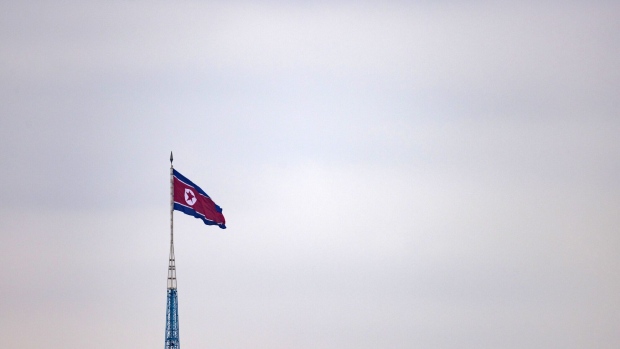Jul 20, 2023
US Slams North Korea’s ‘Dangerous’ Threat, Wants Soldier Back
, Bloomberg News

(Bloomberg) -- The US warned North Korea that a threat to use nuclear weapons was ill-advised, while Washington seeks the release of an American soldier who crossed into the country on foot.
Deputy Pentagon press secretary Sabrina Singh defended the first port call in South Korea of a US submarine designed to fire ballistic missiles with nuclear warheads in about four decades.
She was speaking at a news briefing in Washington just hours after North Korea’s defense minister said such a move crossed a red line and the country was within its rights to respond with a nuclear strike.
“Rhetoric like that, it’s incredibly dangerous,” Singh said Thursday, adding the deployment of the USS Kentucky to the South Korean port of Busan was a sign of long-standing cooperation between the two allies. The leaders of the two agreed in April to step up the dispatch of nuclear-capable US assets to the region to deter Pyongyang from using its atomic arsenal.
North Korea’s defense minister, Kang Sun Nam, said the deployment of the submarine “may fall under the conditions of the use of nuclear weapons specified in the DPRK law on the nuclear force policy,” referring to the country by its formal name in a statement carried by its official Korean Central News Agency.
Kang warned the US and South Korea that Pyongyang’s military plan is for “thoroughly deterring and repelling the crazy maneuvers of the US and its stooges to use nuclear weapons on the Korean Peninsula.”
It’s rare for North Korea’s state media to issue a named statement from the defense minister. The intention was likely to deter the US from sending even more nuclear-capable weapons systems into the region.
The port call isn’t a cause for war as the statement says, said Go Myong-hyun, a senior fellow of the Asan Institute for Policy Studies based in Seoul, but Pyongyang was likely looking for the appropriate way to respond.
“North Korea doesn’t have many cards to play with physically at this point against the US-South Korea action,” Go said.
South Korea’s Defense Ministry said in a statement that the deployment of the submarine “is not a demonstration of nuclear weapons or a nuclear threat to” North Korea.
US President Joe Biden warned Kim Jong Un earlier this year that a use of nuclear weapons would mean the end of his regime. South Korean President Yoon Suk Yeol boarded the USS Kentucky on Wednesday. He drove home Biden’s point, saying the port call would help “to ensure that North Korea cannot dream of a nuclear provocation and sends a clear warning that if it does, it will lead to the end of its regime.”
More: North Korea’s New ICBM Raises Ability To Strike US With Nuke
One factor complicating relations is the border crossing on Tuesday by an Army private named Travis King, 23. He’d been jailed for nearly two months in South Korea for assault and was set to fly to Texas, where he faced expulsion from the military. Instead he left the airport, joined a tour to the border and walked across.
“Our biggest concern about Private King is that we want to bring him home,” the Pentagon spokeswoman said, adding there’s no sign North Korea has responded to requests for communication.
North Korea has detained about 20 Americans since the end of the 1950-1953 Korean War, the most recent about five years ago. Pyongyang often uses them as bargaining chips.
The US and North Korea do not have diplomatic relations. In previous cases, Washington has used a back channel through the North Korean mission to the United Nations. However, Pyongyang this year rejected offers from the Biden administration to talk, making King’s situation more problematic than previous detentions.
Since Washington and Pyongyang don’t have formal diplomatic ties, Sweden has acted as the US’s representative on certain issues in North Korea. The Swedish Foreign Ministry referred questions about the incident to US authorities.
©2023 Bloomberg L.P.







